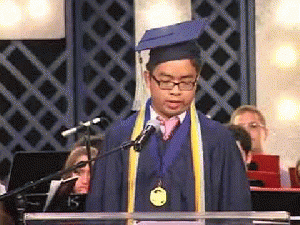Thanks to the efforts of the US Department of Education, high school
graduation rates can be compared across state lines for the first time. The
results of the 2010-11 Four-Year Regulatory Adjusted
Cohort Graduation Rates report is revealing and a bit
disturbing. The top high school graduation rate was in Iowa where 88% of all
students graduated. The lowest was in Nevada where just 61% graduated. (What's happening there?) The median of state
averages for graduation rates was just 80%.
High School Graduation Speech - class of 2008! by YouTube
The nation's high school graduation rates are disappointing,
but when you break down the numbers they become truly disturbing. In almost
every state, White children had the highest graduation rates. In many states
the graduation rates for African-American and Native-American students fell 10 to 20 points below those of White students. A
similar gap can be seen between White students and those who are economically
disadvantaged. The largest race-based gap was in Minnesota where 84% of White
students graduate versus only 49% of Black students. That's a 35-percentage-point gap. The other states with large race-based graduation gaps include Nevada (28 pts.), Wisconsin (27 pts.) and Ohio (26
pts.). These are not the states we tend to think of when we talk about the
racial divide.
But the biggest and most disturbing graduation gaps are
not along racial, ethnic, or even economic lines. They occur in two unexpected categories--children with disabilities and children for whom English is their second
language.
In Mississippi and
Nevada only 23% of disabled students graduated from high school. These are children
who, through no fault of their own, require every advantage they can get if
they are to lead happy, productive lives. In Nevada the graduation gap between students
with disabilities and White students was 48 percentage points. Mississippi did
a much better job overall. White students graduated at a respectable rate of 82%.
The graduation gap for Mississippi's disabled children, however, was 59 points
lower. Contrast that with Arkansas, where there was only a 9-point gap, or with
South Dakota, where there was just a 2-point difference between White students
and disabled students. What is possible for disabled children in South Dakota
should be possible in every state. Over all, the graduation gap between abled
and disabled students is greater than ethnic, racial, or economic factors. The
biggest gaps were mostly in the South, but almost every state needs to do a
better job.
The second disturbing category is the graduation gaps for
immigrant children whose first language is not English. While states such as
West Virginia, Maine, South Dakota, and Arkansas were able to graduate English-language
learners on par with White students, most other states were less successful. The graduation gaps in Georgia (44 pts.),
Nevada, Alabama (both 42 pts.), and New York (40 pts.) were among the biggest. But it is Arizona, by far, that had the
largest gap in the graduation rates between White students (85%) and those who
needed to learn English (23%). This was
a 60-percentage-point drop in graduation rates for English-language learners in
Arizona, and the reason for this poor performance has a lot to do with ideological
politics. Voters in Arizona eliminated
bilingual education in a 2000 ballot measure. Proposition 203 was a popular backlash
against bilingual education in favor of a more nationalistic "English for
the Children Philosophy". Bilingual education was viewed as a politically
correct relic of our liberal past.
It is unconscionable to hold children in the cross-fire
of America's ideological wars. Children are a special class of citizens who
rightfully have special protections and certain undeniable rights, including
the right to equal educational opportunities. To set different standards based
on race, religion, disabilities, or place of origin is unacceptable. To eliminate educational opportunities or to
choose educational programs based on politics over empirical practice is malfeasance.
It harms children and ultimately harms our society. There is no excuse for not duplicating the
success many other states already have in educating children of color, children with
disabilities, and children who speak another language. State sovereignty be
damned. Children everywhere are every citizen's
concern. We must do all we can to remove
politics from public schooling and press the case for competent practices that
gives every child a fair shot at success. High School Graduation for every
child should be our national goal.
(Below are excerpts from an article detailing the
struggle to improve educational outcome for English-language-learning students
in Arizona.)
Bilingual Education vs. English
Immersion
Excerpts:
... Spanish-speaking [families in] Nogales
[Arizona]... in 1992 [filed] a federal suit aimed at improving educational
opportunities for non-English-speaking students in the overwhelmingly Hispanic
town. The class-action suit claimed the school district was failing to comply
with a federal law -- the Equal Educational Opportunities Act of 1974 -- which
requires each state to take "appropriate action" to ensure that
English-language learners (ELLs) enjoy "equal participation in its
instructional programs."
... The plaintiffs won a pivotal decision in 2001
requiring Arizona to boost funding for English-language learning in Nogales and
the rest of the state. In a narrowly divided decision in June, however, the
Supreme Court gave state officials an opportunity to set aside the lower court
ruling.
Writing for the 5-4 majority, Justice Samuel A.
Alito Jr. said the federal district judge had failed to adequately consider
changed circumstances since 2001. Among other changes, Alito cited the state's
decision to drop bilingual education in favor of so-called "sheltered English
immersion" as the officially prescribed method of instruction for students with
limited English proficiency.
Arizona's voters had decisively rejected bilingual
education in a 2000 ballot measure. Along with similar measures passed in
California in 1998 and Massachusetts in 2002, Arizona's Proposition 203
embodied a popular backlash against bilingual education that had grown since
the 1980s. Critics of bilingual teaching viewed it as a politically correct
relic of the 1960s and '70s that had proven academically ineffective and
politically divisive. [snip]
... The debate between English-only instruction
and bilingual education has been fierce for decades. "People get very hot under
the collar," says Christine Rossell, a professor of political science at Boston
University and critic of bilingual education. [snip]
... Those who support a bilingual approach, says
Arizona Superintendent of Instruction Thomas Horne, "aren't interested in
teaching the kids English," but want to maintain "a separatist nationalism that
they can take advantage of." Horne, a Republican, intervened with the state's
GOP legislative leaders to try to undo the federal court injunction.
[snip]
... "It's a growing challenge," says
Patte Barth, director of the Center for Public Education at the National School
Boards Association (NSBA). "We have many more children coming into our schools
for whom their first language is not English..." Voluminous, statistics-heavy
studies are cited by opposing advocacy groups as evidence to support their
respective positions on the bilingual versus English-only debate. But Barth
says language politics, not research, often determines school districts' choice
of instructional method. "A lot of it is political," she says. "A lot of
decisions about language instruction aren't really informed by the research
about what works for children."






